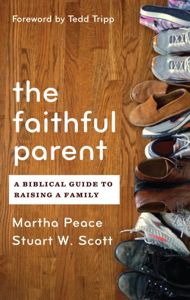
Martha Peace and Stuart W. Scott
Reviewed by: Luis A. Orteza
The Faithful Parent: A Biblical Guide to Raising a Family, by Martha Peace and Stuart W. Scott. Published by P&R, 2010. Paperback, 256 pages, list price $14.99. Reviewed by OP minister Luis A. Orteza.
In a culture where the role of the parent has been reversed, neglected, and even lost, The Faithful Parent provides a biblical remedy to the damaged relationship between parent and child, a relationship that God intended to reflect his love for his children.
Taking their cue from Ephesians 6:4, where Paul exhorts parents to bring up children "in the discipline and instruction of the Lord," the authors outline their purpose: "Our aims are to present the underlying biblical basis for this discipline and instruction, to give you a picture of everyday life with your children, and to challenge you to become a faithful parent who perseveres and leaves the results to God" (p. 4).
This book is intensely practical. It gives parents commonsense ideas on what to teach and how to handle children in life's unplanned, unexpected situations. The book is not limited to the early years of the children, but instead offers practical advice to deal with circumstances that all parents face as their children get older.
Although the book is commendable, several observations need to be made. First, the explanation of the word "obey" from the Greek (p. 12) is unhelpful and unnecessary. The authors use the fallacious word-study method to arrive at their conclusion.
Second, those of a covenantal persuasion will disagree with the view expressed by the authors on page 78: "We teach our children these things so they can learn about God and have a proper worldview and see our joy in the Lord, not because we think they are already or automatically Christians." There are other statements in the book that could be construed to imply that parents should not assume that their children are converted (p. 34). But covenantal teaching says a child of a believing parent is "holy" (1 Cor. 7:14). It is in light of this Christian identity that the child is to be taught and raised in the admonition and discipline of the Lord. Covenantal parents teach and admonish children in the discipline of the Lord because their children are in the covenant. Their children do not have a kind of neutral identity that can only be changed at their conversion. In Reformed and Presbyterian churches, children are always considered members of the church. God has made a claim on their lives, as sealed and signified at their baptism.
Third, I would recommend this book to those struggling with parenting issues because it takes a unique approach to parenting by grounding their argument on Scripture. However, because differences exist in our interpretations, I would advise those with covenantal positions to understand that not all of the advice is directly correlated to a Reformed understanding of the faith.
June 29, 2025
June 22, 2025
June 15, 2025
June 08, 2025
June 01, 2025
Anxiety: Finding the Better Story
May 25, 2025
April 27, 2025
The Devoted Mind: Seeking God’s Face in a World of Distraction
© 2025 The Orthodox Presbyterian Church